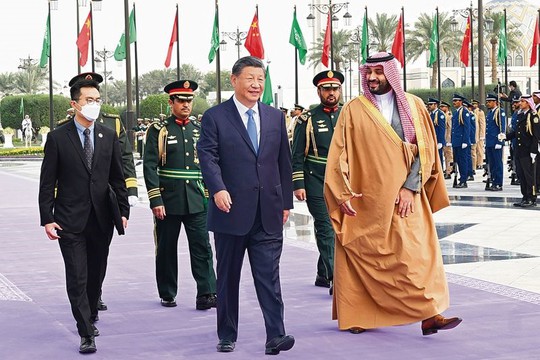Epochal: Beijing is inexorably becoming a participant in the shaping of the world order and the international community welcomes it
Photo: AP
The China-brokered Saudi-Iranian normalisation of diplomatic relations. What has happened is an epochal event, writes M.K. Bhadrakumar, Indian Ambassador and prominent international observer.
Henry Kissinger drew the analogy of his own accomplishment in an extraordinary diplomatic career when, as Secretary of State in the Richard Nixon administration, he helped achieve rapprochement with Beijing amidst its tensions with Moscow.
One aspect of the Saudi-Iranian deal that has implications for India’s immediate external environment is that the strategic situation in the Persian Gulf region, India’s extended neighbourhood, has dramatically changed.
This can only be seen as the culmination of a series of repositioning on the part of the regional states that have been underway in the regional politics, as they increasingly took to diversifying their foreign policies away from the preponderant dependency on the West historically, and steadily and unmistakably began asserting their strategic autonomy with a newfound self-assuredness — be it Saudi Arabia, the UAE, Egypt or Turkey.
Today, Israel stares at strategic isolation in its region and America, its mentor-cum-benefactor-cum-guardian-cum-protector, stands diminished.
Kissinger noted that ‘China has in recent years declared that it needs to be a participant in the creation of the world order. It has now made a significant move in that direction.’
Of course, Chinese President Xi Jinping himself stated last week that Beijing should ‘actively participate in the reform and construction of the global governance system’ and promote ‘global security initiatives’.
India cannot but be wary that the Biden administration’s main thrust is military deterrence fuelling an Asian arms race, with which India can identify only at the risk of grave consequences.
NATO’s defeat in Ukraine will seriously damage the transatlantic system and the US’ hopes that casting China as enemy might rally Europe are unrealistic. Besides, the China-Russia quasi-alliance will resist. Should India get sucked into the maelstrom?
The US strategies seriously impact peace and stability in the Indo-Pacific, as they are anchored on bloc politics and confrontation, and their self-serving geopolitical agenda is to create a NATO-replica in the Asian continent.
The Anglo-Saxon clique known as AUKUS — comprising the US, Britain and Australia—opens a Pandora’s box as other countries will likely follow suit, which will seriously impact the international nuclear non-proliferation regime and even lead to its collapse. Will that serve Indian interests?
read more in our Telegram-channel https://t.me/The_International_Affairs

 9:36 22.03.2023 •
9:36 22.03.2023 •























